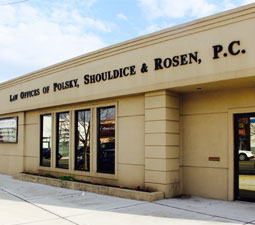Carpal Tunnel Syndrome
Carpal tunnel syndrome is one of the most common workplace injuries (or occupational health problems) in the United States. As a result, it leads to more lost work time than any other work related injury.
The wrist and hand pain associated with carpal tunnel can range from a temporary annoyance to a lifetime burden.
How Does It Happen?
If you are working in a job where you routinely perform certain wrist and hand movements, you may be at higher risk of developing carpal tunnel.
In some cases, workers who develop carpal tunnel can receive Workers' Compensation benefits. However, because this condition develops over time and not from a specific injury, trying to prove you have a carpal tunnel Workers' Comp claim is not always a simple process.
What Is Carpal Tunnel?
Carpal tunnel develops when tissue around your wrist becomes irritated and inflamed, putting pressure on the median nerve. The median nerve is the nerve that extends from your wrist to your hand.
If you have carpal tunnel, the following symptoms may show up in your hands, fingers and wrists:
- Pain (ranging from dull to intense)
- Tingling
- Burning
- Numbness
- Weak grip
- Clumsiness
- Loss of fine motor coordination
Carpal tunnel may take you by surprise. After feeling fine for years, the symptoms may set in quickly and you could suddenly find it incredibly difficult to do basic tasks. This condition can also intensify over time, so you should not ignore it.
Depending on the severity of the problem, treatments can include:
- Wearing a splint
- Medication (to reduce inflammation and swelling)
- Surgery
Who Is At Risk?
If your job involves performing repetitive stretching, bending, twisting or striking motions then you have a heightened risk of developing carpal tunnel. Awkward posture and positioning at work can also contribute to these problems.
Workers who are commonly affected by carpel tunnel include:
- Clerical and data-entry workers
- Assembly line workers
- Grocery store workers
- Butchers
- Chefs
- Professional drivers
- Musicians
If you are a woman, you are twice as likely as men to develop this health problem, and your risk will increase with age. Some non-work-related factors are also associated with higher carpal tunnel rates. These include:
- Diabetes
- Rheumatoid arthritis
- Pregnancy
- Thyroid problems
- Obesity
Carpal Tunnel and Repetitive Stress Injuries
Carpal tunnel is one of many types of repetitive stress injuries, also known as repetitive trauma or repetitive motion injuries. These types of ailments can develop when muscles, tendons, ligaments, and other tissues are damaged over time, due to repeated exertion and strain. Tendonitis and bursitis are just a few of the other examples.
Taken together, repetitive motion injuries are one of the biggest causes of Workers' Compensation payments across the country. However, because they develop gradually, it can be difficult to prove they are actually caused by your work.
Think about a clerical worker who spends 10 years typing at a computer, but who also has a part-time job and plays golf some weekends. The worker notices symptoms of carpal tunnel. Did the 10 years typing for their job contribute? Was it their part-time job? Or what about the wrist movements required for golf? Repetitive stress injuries might be easily identified, but pinpointing a cause is not always so easy.
Will Your Claim Be Covered?
Under the Workers' Compenastion system, the burden falls on you, the employee, to prove your carpal tunnel syndrome was caused by your job duties and not some outside factor.
It can be hard, but if you have the right people fighting for you, it is possible. In some cases where you have a pre-existing condition, you may be able to claim Workers' Compensation benefits if you can prove your job duties made the problem worse.
Time is an important factor in this category of claims. Symptoms can take months or years to show up, so an employee who has been at a job for one week is unlikely to collect compensation. However, a Workers' Compensation lawyer can help you and advise you about the specific details of your case.
What If You Notice Symptoms?
Every case of carpal tunnel is unique, so there is no one-size-fits-all answer. However, it is critical to seek medical help early to help improve your chances for recovery. It is also important to notify your employer as soon as possible once you notice symptoms. These are important steps in your overallWorkers' Comp claims process.
Disclaimer: For informational purposes only. This is not a substitute for legal advice. If you need legal advice please contact us.


